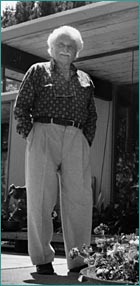Eichler Salesman Jonas Harschel

One might assume that the reason Jonas Harschel brushed away $30 thousand—a handsome yearly salary in 1960—and a high-powered sales position in the insurance business to sell houses for a new, smaller company had something to do with bigger money waiting in the wings.
As Harschel, at 78 still quite proud of his ethical and forthright constitution, recalls one of the most dramatic changes in his life, it had everything to do with enriching his soul, not his pocketbook. In fact, what drove this man from his corporate throne, as one of the top-25 national salesmen for Penn Mutual, to a pay cut with Eichler Homes, Inc. were his intense, tormented feelings—over racial discrimination and the death penalty.
"These were the Joe McCarthy and John Birch Society days," Harschel pointed out, "and as one of only two liberals in the 100-man San Francisco-based insurance agency, I detested my colleagues' attitudes on social and political issues.
"I was especially appalled when I was taken aside and told that a policy I had applied for a black man—a terrific guy and a hard worker—was turned down 'because he was a Negro.' I told the company if they refused a policy on him, I'd walk out immediately. The man got his policy, but my interest in the future of the company was gone. Hell, a couple of decades earlier, Hitler started out that way, and he wound up killing millions, including 60 members of my family and friends."
The World War II years were indeed traumatic for Harschel. When he and his older brother left their native Den Helder, Holland, in April 1940, for what was anticipated to be a six-month stay in the United States, the two young Jews were not prepared for the tragedy that would accompany Germany's invasion of Holland two weeks later. The 21 year-old Jonas was left devastated, stranded from home and family in a country he didn't like, whose people spoke a language he couldn't understand.
"This country was such a disappointment to me then, I can't begin to describe it," he said. "I had seen every American movie that had come to Holland, but they'd never shown the ugliness of Newark, New Jersey."
In nearby Irvington, Harschel started his new life, selling Fuller brushes, the first of nearly sixty jobs that would follow. He adapted quickly, and soon discovered that as a salesman, he was a natural and a money-maker.
Following a stint in the Army that ended in 1945, Harschel relocated to California. Five years later, while renting their San Francisco apartment, he and wife Cora devoted their weekends to combing the Bay Area looking for their first home, but were completely disappointed by the lack of available homes that represented their cultivated taste—contemporary design.
"The concept of contemporary architecture seemed alien to brokers back then," claimed Harschel. "I wanted something from the twentieth century. Not a Cape Cod cottage or a Hansel and Gretel. They would show us some stupid box with a picture window, and actually expected us to like it!"
One broker had suggested that the Harshels check into the up-and-coming Eichler Homes, in Santa Clara County, but that seemed too far away from the couple's San Francisco hub.In the end, the Harschels decided to build their own home, on two hillside lots they purchased in Belmont. When they heard that Bill Patrick and two other young disciples of architect Frank Lloyd Wright were building a remarkable modern house in a Woodside glen, Jonas drove to the site for a close look.
"These guys were impressive, putting up a building that actually complemented the site," remembers Harschel. "They were not only designing and building it themselves, they even camped on the site in tents, cooked on a homemade grill, and manufactured some of their own materials. So, as their very first client, I hired Patrick to design and, together with the others, build my Belmont home."
A two-bedroom structure laid out as a triangular module on three levels, the Harschel house was designed with drama and good taste but, to no one's surprise, left the building department so baffled that they soon dubbed it "the freak house" on the official county records.
In early 1952, in the midst of his own construction, Harschel viewed his first Eichler-made home, and was stunned by its simplicity, openness, and price.
"Two bedrooms, one bath, for under $11 thousand," he recalled. "A stupendous bargain compared to what I was building for almost three times that much. And we hadn't even finished yet. It was the finest merchant-built home I'd seen anywhere."
Harschel's first significant encounter with Eichler Homes, which easily could have been his last, came nearly eight years later, in late 1959. As insurance salesman, Harschel had been derailed for months from gaining an appointment with Joseph Eichler. As a last-gasp attempt, he approached the builder as he and his entourage were exiting their Palo Alto offices for lunch.




